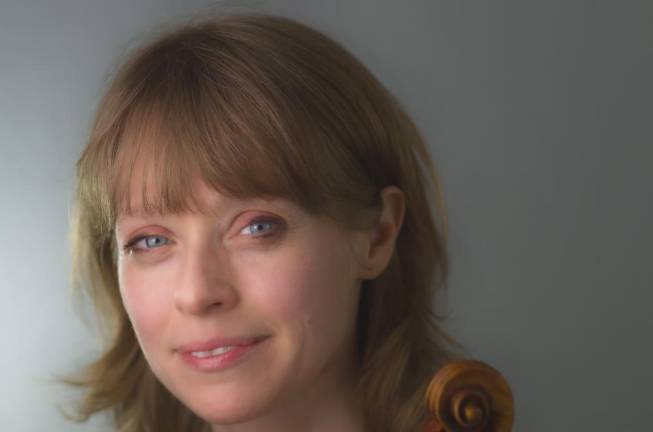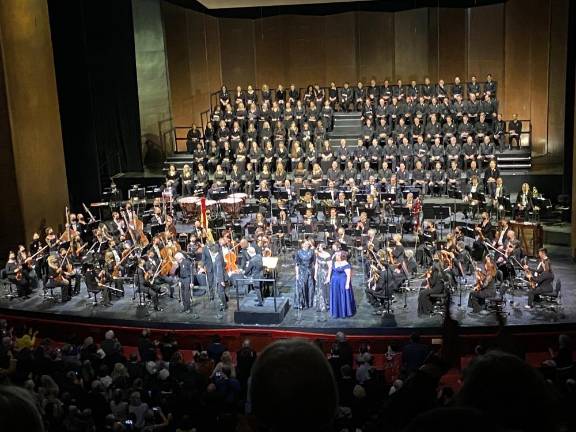Meet a Member of the Metropolitan Opera Orchestra
Amy Kauffman, a member of the first violin section, describes what it takes to play at the Met
The Met Opera is known as one of the best and most prestigious opera houses in the world, attracting thousands of music lovers every year. However, there’s much more going on during every opera than what’s on stage. I was given the opportunity to learn from the professional violinist, Amy Kauffman, what goes on in the orchestra pit and how to make it as a professional musician.
When did you know you wanted to be a professional violinist?
Well, I think I first knew I wanted to be a violinist, or have a job related to the violin when I was in second grade. I have this old worksheet that my mom saved from back then that asked what job I hoped to have when I grew up and I wrote I wanted to be a violinist.
How did you get into violin?
I was about 4 years old when I first started violin lessons. My mom just signed me up for violin as something to do. I grew up in a small town in Indiana, but luckily there was a violin teacher who taught young kids there. I was always on the classical track, but I really wish I had also learned to play other kinds of music like bluegrass or jazz, as my training was strictly classical.
Where did you study music past childhood violin lessons?
I went to Indiana University for college and then to Julliard for graduate school. Both places had amazing teachers that were so serious about music, and I was surrounded by people who practiced music for hours and hours a day. It was really inspiring to be around people who were so passionate and driven. Since Indiana is such a big university with lots of other non-arts departments, there were also lots of opportunities to take classes outside of music. Julliard, on the other hand, was all arts and more focused on performing. There was some music history and theory classes, but no classes outside of the arts disciplines.
How did you start at the Met Opera?
I played in two orchestras before the Metropolitan Orchestra. First, I was at the Houston Symphony and then my next job was at the Pittsburgh Symphony. After that, I auditioned for the Met. The process of joining any orchestra is based on an audition. Usually there are three rounds of auditions. The orchestra sends everyone who is auditioning excerpts, short pieces of music that you would actually play if you were in the orchestra. You have to learn a whole list of excerpts and then you play behind the screen so the process is completely anonymous and so that candidates are judged solely on their music and not their looks, gender, race, or anything else. In fact, at the Met, they actually have carpeting in the audition room, so the judges can’t even hear whether someone is wearing high heels or not. It’s completely based on how you play. You play for just a few minutes in the first round and the second round if you get invited back. When everyone is done, the judges take a vote to decide on which candidates they’re choosing. They do everything they can to make it a fair process throughout.
What’s your favorite part of your job?
I would say working with my colleagues. It’s a very friendly and overall great place to work. It’s also so fun to be in the middle of all that sound with both the orchestra and the singers. I really like the feeling of just being surrounded by it all.
Do you have a favorite opera or piece that you participated in?
I love all Mozart operas. They’re just so beautiful and they always have something that surprises you. A lot of the time, you think you can predict what’s coming next because it sounds so classical, but there’s always something surprising in the music and I like that a lot.
What’s your schedule like?
During the season, the Met has seven shows every week and everyone in the orchestra plays four of those seven shows. Usually however, it’s not the same days every week. On top of that, there can be as many as five rehearsals a week. Usually though, there’s three or four daytime rehearsals lasting about 3 or 4 hours and four evening shows. The evenings can get very late, because operas can be so long. Some are shorter but some go on and on, and we get out at midnight sometimes.
How do you handle stage fright?
The best advice I got about stage fright was to just remember that the people listening to you, they are rooting for you, and they just for want things to go well and for everyone to play well. People aren’t there to criticize. They want to enjoy this music together. I think that’s a really nice perspective.
What’s your advice for anyone hoping to become a professional violinist?
It’s sounds silly, but practice as much as you can and listen to all kinds of music, not just what you’re working on. When I was younger I was so focused on what I was working on for my lessons, but it would have been great if I had tried to absorb more music in general. And if you’re fortunate to be in a school with other people who are serious about music, enjoy that. Play with other people, go to other people’s concerts and soak up as much as you can.
Lea Efran is a NYC high school junior. She plays volleyball, does jiu-jitsu and is a Stone Soup Magazine honoree.

